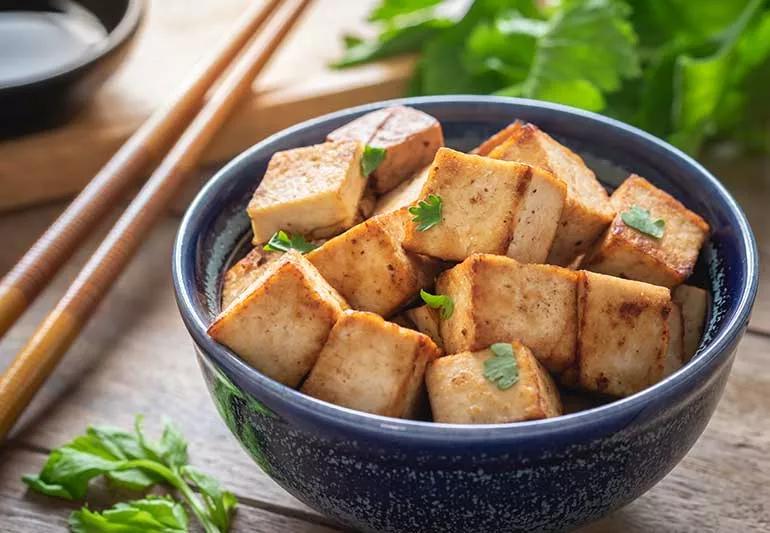A protein powerhouse, tofu builds muscle, protects your heart and lowers cancer risk

Image content: This image is available to view online.
View image online (https://assets.clevelandclinic.org/transform/58ea55c3-5934-4d80-a709-75087e31bdfa/Tofu-Benefits-1060287836-770x533-1_jpg)
bowl of cooked tofu
Many meat-eaters are catching on to what vegetarians and vegans have known for some time: Tofu is an excellent addition your plate, whether you regularly eat meat or not. This soybean and water mixture (sometimes called bean curd) is quickly becoming a crowd-pleaser for all types of eaters.
Advertisement
Cleveland Clinic is a non-profit academic medical center. Advertising on our site helps support our mission. We do not endorse non-Cleveland Clinic products or services. Policy
And there are many reasons behind tofu’s rising popularity: It works well in many dishes, is easy to use and is super healthy. Registered dietitian Natalie Romito, RD, LD, agrees and shares why tofu should become a regular part of your meal plan.
With 10 grams of protein in a 3/4-cup (100 grams) serving, tofu is an excellent plant protein source. The high protein is one reason people who follow a vegetarian or vegan meal plan favor bean curd as an alternative to meat.
Tofu’s an especially good choice for people who eat vegan to ensure they meet their recommended daily protein intake.
“Unlike animal sources of protein like beef, tofu is cholesterol-free,” says Romito. And while a serving of tofu has 5 grams of fat, it’s mostly polyunsaturated fats. These fats are rich in omega-3 fatty acids that help control cholesterol.
A 3/4-cup serving of tofu has about 100 calories, 5 grams of fat and 1 gram of fiber. It’s also packed with these vitamins and nutrients:
Advertisement
Source: U.S. Department of Agriculture
Tofu provides you with high levels calcium, manganese, iron and vitamin B5, which is needed to break down carbs and fat for energy. And tofu contains all the essential amino acids your body needs. It’s also a primary source of isoflavones — a type of plant-made flavonoid with a range of health benefits, including antioxidant, anti-inflammatory and anti-cancer properties.
Here are five reasons to make tofu a regular part of your meals:
Soybeans and soy products like tofu are rich in isoflavones. These flavonoids (plant-based chemicals) help lower your blood pressure and offer other heart-protective benefits. A 2020 study found that people who ate a serving of tofu each week had an 18% lower risk of heart disease than those who didn’t.
A different study found that people who ate soy products four or more days a week had a lower risk of heart attacks. “Tofu is a great option for anyone following a heart-healthy diet — which should be all of us,” says Romito.
In the past, people were concerned that soy foods increased cancer risk. “Isoflavones weakly mimic estrogen, so there were uncertainties about a potential link between soy and breast cancer,” notes Romito.
But decades of studies haven’t found a connection. Some of the evidence:
Tofu is a complete protein — it has all nine essential amino acids that your body needs to work well. “Your body uses amino acids in protein to repair tissues, carry nutrients and build muscle,” says Romito.
Tofu also contains calcium and magnesium, which help your body build and maintain strong bones. Calcium- and magnesium-rich foods may prevent bone loss and osteoporosis. Magnesium is also an important nutrient for healthy nerve and muscle function.
Protein can help shed pounds. It takes longer and requires more energy (calorie burn) for your body to break down protein. As a result, you feel fuller for longer, which can help you maintain a healthy weight.
Advertisement
Tofu is extremely versatile. You can use it instead of meat or as a base for nutritious smoothies and delicious desserts.
Tofu contains soybeans, water and a substance that binds the two together (a coagulant). It’s often pressed into a block shape. There are different types or textures of tofu, which reflect the amount of water.
Tofu types include:
If you’ve never cooked with tofu, consider starting with this simple and delicious recipe for sesame seed-crusted tofu. It requires just eight ingredients and comes together easily. Pair the tofu with a salad or roasted root vegetables for a complete meal.
Advertisement
You can also try one of these tasty tofu recipes:
Advertisement

Sign up for our Health Essentials emails for expert guidance on nutrition, fitness, sleep, skin care and more.
Learn more about our editorial process.
Advertisement
Pick bell peppers to help fight cancer, memory decline and joint pain
The tropical fruit is a good source of antioxidants and vitamin C
High amounts of cholesterol and saturated fat in red meat may be linked to heart disease
The leaves and pods from this tree are rich in essential nutrients
This starchy root vegetable is a staple in many global cuisines — but it has to be prepared correctly, or it can cause serious concerns
These delicate green sprouts can give you an extra dose of vitamin K and other nutrients — but they’re not safe for everyone
Edamame, lentils and chicken breast are good sources of protein
Eating this root vegetable can help support your eye, heart and brain health
Prioritize your health by managing stress, strengthening your social connections and getting quality sleep
Bolsters, blankets, pillows and blocks can offer extra support, stability and comfort
Allergies, postnasal drip, asthma or reflux could be to blame for a cough that won’t quit